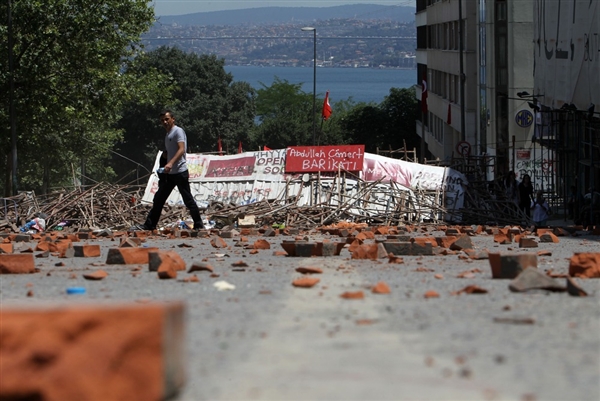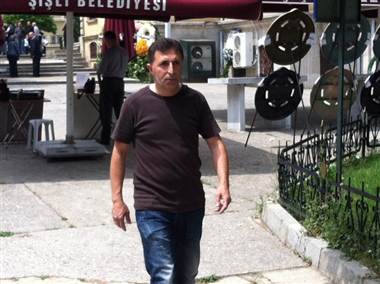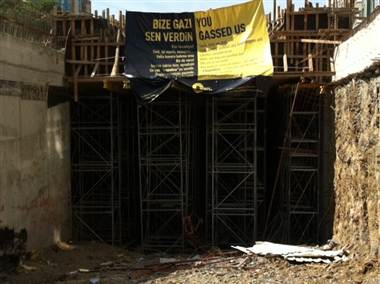
Thanassis Stavrakis / AP
A pedestrian walks past a barricade, with the Bosphorus Bridge in the background, near Taksim Square in Istanbul on Monday June 10.
ISTANBUL, Turkey – Fatma, a 24-year-old trained nurse, thought “here we go again” when she learned on Twitter that the Istanbul Municipality had plans to modernize the city’s iconic Taksim Square, which includes one of the few green parks left in the urban sprawl.
“There was lots of talk about making the square better, but I was very worried,” said Fatma, who requested anonymity because of the sensitivity of the issue. “We’ve seen the government destroy other parks in Ankara and other cities.”
A few weeks ago, local papers published the plans with no public debate or discussion. But what she saw shocked her. “They were going to pull out many trees and build this huge shopping mall around the park, covering most of it with concrete!” Fatma said.
The plans included an Ottoman-style military barracks, and a cultural center, including an opera house. If the plans are implemented, the park’s modest forest of trees would be reduced to garden-size.
Fatma rushed to Taksim to join a few friends already sitting-in to protect the trees. At dawn, without warning, riot police attacked her and other sleeping protesters with tear gas and water cannons. Several protesters were injured.
No one could have imagined then that the raid would incite days of rioting and turn a local “green” issue into a nation-wide protest, killing three and injuring at least 4,000 in some 78 cities.
Fatma is still in the park, but now she is treating the sick and injured in a makeshift health clinic. “This is not just any park,” she said. “It’s a historic park, and it doesn’t need a shopping mall at all.’’
But many Turks – indeed about half the population – would disagree.
“The Taksim project is good for Turkey and for the people,” said middle-aged Zulfu Aycil, outside a mosque in Kasimpasa, the neighborhood where Prime Minister Tayyip Erdogan grew up.
Aycil, who voted for Erdogan’s Justice and Development Party (AKP) in the last election two years ago, likes the Taksim redevelopment plan a lot, because it moves all throughways beneath the square, freeing it from Istanbul’s endemic traffic jams.
“Pedestrians will be able to shop more easily and spend more money, and that will help tourism and the economy,” said Aycil, who works in a store near Taksim.
But the square’s battle lines now go far beyond the initial standoff between local environmentalists and city planners. The riot police’s wanton aggression struck a nerve, and Erdogan is facing his biggest political crisis since coming to power 10 years ago, when he promised to bring Turkey into the 21st century with trappings of its Ottoman glory days.
Turkish Prime Minister Recep Tayyip Erdogan criticizes groups protesting his leadership on Sunday.
Under Erdogan’s leadership, most here agree, Turkey has become an economic success and a force to be reckoned with in the region. But his construction mania and a series of new laws have angered secular Turks, even as they have pleased his growing power base – the conservative, Islamist middle-class.
“People are fed up with Erdogan’s approach,” said Ali Orcunos, a 64-year-old pensioner who was protesting in Taksim Square with a group younger than his own children. “Which is 'I decided this, so I will do it this way because the 50 percent who support me want it so; and the other 50 percent don’t count.'’’
In recent months Erdogan has imposed restrictions on the sale of alcohol, a drawing down of social security, the separation of boys and girls in primary and secondary schools, and an emphasis on religious – over national – holidays.
And after the initial clashes, Erdogan, rather than seek a conciliatory tone, skewered the protesters, calling them looters who were “arm in arm with terrorists.”
“I was stunned,” said Begum Uzun, one of the protesters on the square. “I expected Erdogan to say something that would slow down the protest, to be more rational.”

Jim Maceda / NBC News
Zulfu Aycil, a supporter of Turkey's Prime Minister Tayyip Erdogan, likes the plans for the redevelopment of Taksim Square.
Instead the rioting went viral. “This went from something small to something huge not just because of the police actions,” explained Fatma, the medic. “It was more a last-straw reaction by people across Turkey to Erdogan’s arrogance and policies.”
Fatma said the protest is still growing, and that protesters – who’ve built a tent city in the leafy park inside Taksim Square – won’t leave until Erdogan and his government resign. But fellow volunteer medic, Gokhan Safak, 40, disagreed with his colleague.
“I don’t think this protest is going to go anywhere. It will die out,” he said. “But we’ve already scared Erdogan – it’s been a wake-up call. And that’s already a victory.”
Perhaps. But Erdogan shows no signs of changing course – much less resigning. He’s said that the plans for Taksim Square will push through, and he’s now added a mosque as well.
During a fiery speech from the top of a bus on Sunday, he condemned the protesters.
Turkish political analyst, Cengiz Aktar, who’s known Erdogan for years, says the AKP leader isn’t capable of backing down.
“Turkey can still turn things around, despite this setback,” he said. “But unfortunately Erdogan isn’t flexible enough to do that. It’s not his style. He’s acting increasingly like a lonely autocrat, surrounded by yes-men, and no women.”

Jim Maceda / NBC News
A banner saying "You Gassed Us," hangs over a halted construction site in Istanbul's Taksim Square.
Meanwhile, the tunneling under the square – which began in November – stopped after protesters barricaded all access roads to Taksim and covered the stalled construction sites with graffiti.
One banner reads, “You Gassed Us.” And a court injunction filed by protesters has temporarily halted the pulling out of trees at the park.
Feeling more confident, people are digging in at Taksim. Burnt-out vehicles from the first violent days have been painted over in bright colors.
But analysts like Aktar are more pessimistic. “This national crisis could turn into a real conflict. A kind of civil war.”
Triggered by a grove of sycamores.
NBC News' Jim Maceda is based in London. He’s on assignment in Turkey.
http://worldnews.nbcnews.com/_news/2013/06/10/18885275-turkey-crackdown-is-last-straw-for-erdogan-opponents?lite
